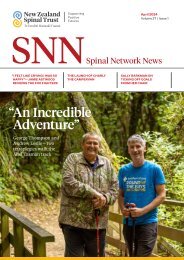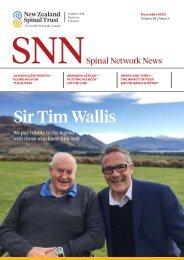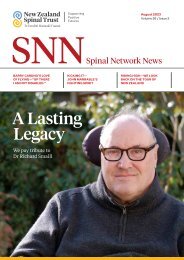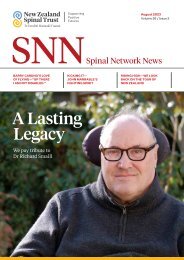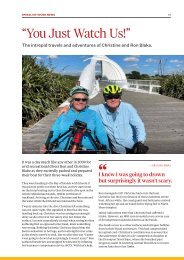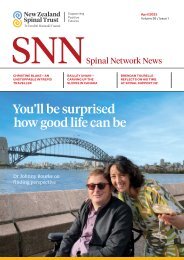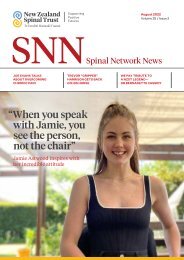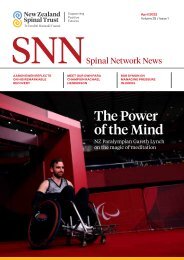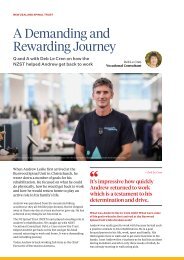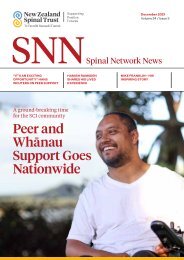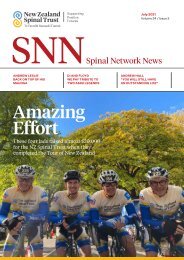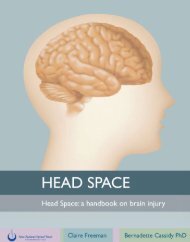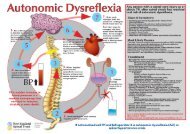SNN_December 2022 Issue_web low res
You also want an ePaper? Increase the reach of your titles
YUMPU automatically turns print PDFs into web optimized ePapers that Google loves.
NEW ZEALAND SPINAL TRUST 14<br />
FLYING HIGH: Brad says one of the hardest parts of writing the book<br />
was reliving his life before the accident. Photo credit: Chris Garrison.<br />
shitting yourself or whatever, everything that I went<br />
through and had to adjust to—that's all in there. It was all<br />
part of my journey.<br />
I imagine it would have been difficult to recall your<br />
life before the accident.<br />
That was the hardest part in the whole process. It was<br />
challenging mentally to think about my life before my<br />
accident. It’s hard to go back there.<br />
The most challenging part when it came to the actual<br />
writing was crafting the learnings from Susie, my<br />
kinesiologist and my life coach. We had conversations<br />
with her helping me through everything that I needed to<br />
learn. I had to go back and remember, and create<br />
dialogue. I'm proud of how it all came together.<br />
The SCI community will benefit from how honest you<br />
have been, was that one of your goals?<br />
Yeah and not just someone with a spinal cord injury. It’s<br />
people being able to relate in any sort of struggles. I tried<br />
to make it broad so people can apply these lessons to<br />
anything whether it's financial struggles or a break-up or<br />
divorce or loss of a loved one or whatever. So hopefully<br />
there is something for everyone.<br />
I guess it's the same with the stuff I post on social media.<br />
It’s good to be honest so others can benefit from your<br />
struggles and what you have learned.<br />
What have been some of the ways you've won the<br />
mental battle and stayed positive?<br />
going to last. And honestly, neither are the good times. It's<br />
all ups and downs and it's realising that happiness and<br />
peace in our lives isn't necessarily a destination, but more<br />
a journey that we need to go through constantly.<br />
We have to be willing to face the reality of the struggles<br />
we're going through. In a situation like mine, with a spinal<br />
cord injury, it's not easy to brush them aside. You can’t<br />
make yourself feel better by going for a run or going to the<br />
gym by getting a good workout or having sex or whatever<br />
it is, these kinds of coping mechanisms that we may have<br />
used in the past to avoid or cope with life.<br />
All of a sudden, I was in a place where I was forced to face<br />
it. So we've got to be willing to do that and digging into<br />
the beliefs behind the emotions and everything that we're<br />
going through. The key thing is sitting with emotion—as<br />
opposed to pushing it aside—and trying to learn from it.<br />
What would you say to a 27-year-old Brad who was<br />
coming back from overseas and at the start of the journey<br />
with a spinal cord injury and scared about his future?<br />
I mean to be honest 27-year-old Brad probably would’ve<br />
told me to piss off if I came and tried to tell me anything<br />
about how my life was going to be OK [laughs]. I didn't<br />
want to hear from someone in a wheelchair about what<br />
my life was going to be.<br />
But if I said something, it would be learn along the way.<br />
You can find joy and love in life and have great experiences<br />
regardless of a spinal cord injury. It's about embracing<br />
change and learning to adapt along the way.<br />
Remember that it’s all temporary. The bad times aren't




